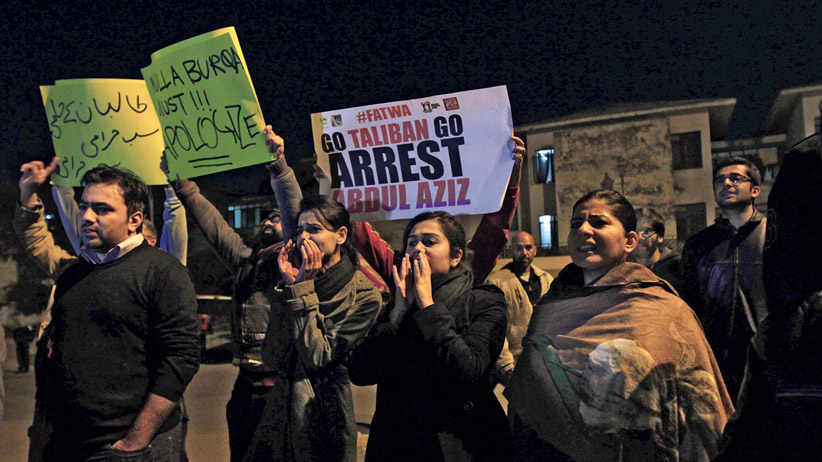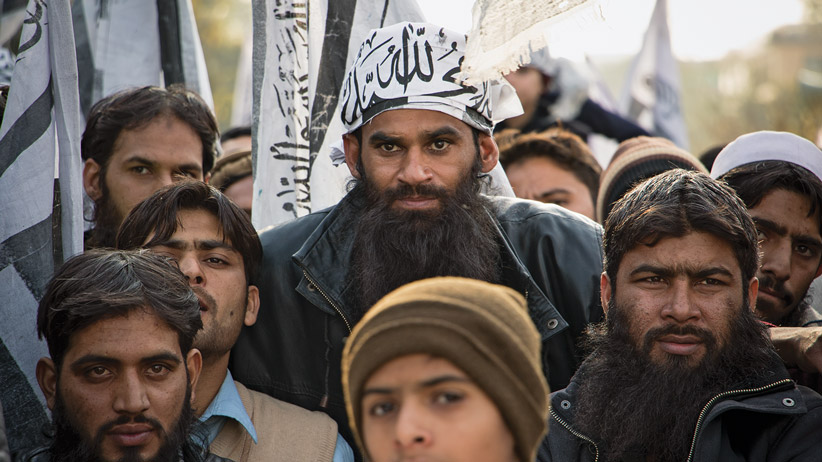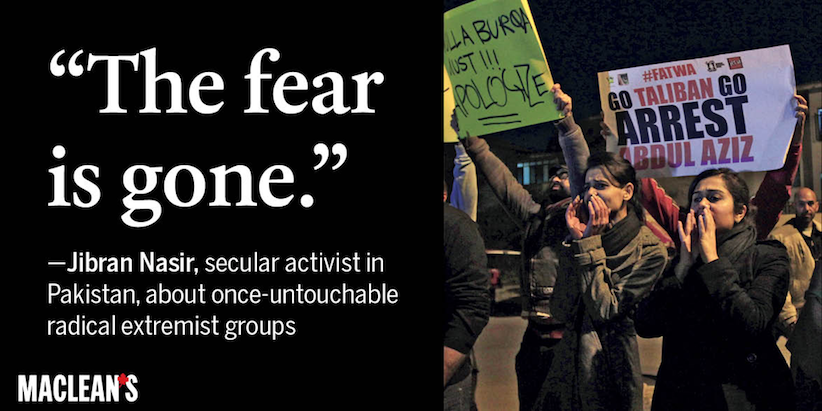Pakistan fights back
Inside the secular movement that’s fighting back against Pakistan’s militant Islamic preachers
Maulana Abdul Aziz, the Red Mosque cleric and member of the Taliban negotiating team, shows religious books to media during a news conference in Islamabad, Pakistan, Friday, Feb. 7, 2014. Aziz said that he will not take part in talks with the Taliban and the government committee until Quran and Sunnah are not made the basis of negotiations. Credit: B.K. Bangash/AP
Share
A day after Pakistan suffered its worst act of terrorism—a vicious attack by the Taliban on a school in Peshawar that left 152 dead, most of them children—Jibran Nasir decided to join a candlelit vigil in the F/7 neighbourhood of Islamabad. The event, set among the neatly manicured gardens and posh villas of Pakistan’s elite, far from the violence plaguing Pakistan, seemed like little more than “drawing room activism” to the 28-year old lawyer and activist. The outrage demanded something more, Nasir felt. Pakistanis, particularly the class he represented—well-off, educated, young—had remained silent for far too long. “I wanted to send a message,” Nasir recalls.
When he arrived at the vigil, he waded through the crowd, approached the event organizer and suggested that everyone should make their way to Islamabad’s Red Mosque, where one of Pakistan’s most notorious preachers, an ardent supporter of the Taliban and other radical Islamic groups, was holed up.
Abdul Aziz Ghazi, the self-proclaimed defender of Pakistan’s Islamic morality, led an armed revolt at the Red Mosque in 2007, demanding that Pakistan implement a strict brand of sharia law. The week-long uprising was ultimately suppressed by the military, but at the cost of dozens of lives, mostly teenagers radicalized at Aziz’s seminary. For years, Pakistani authorities had left the radical preacher alone, fearing the instability he could unleash if he was arrested. Unrepentent, the preacher had then renamed the library at his seminary after Osama bin Laden. In a November 2014 interview with the BBC, he called bin Laden a “hero” and said that he had “inspired the mission” of his school. Still, nobody dared to touch Aziz.
In the wake of the Peshawar school attack, while Pakistanis around the country were struggling to comprehend the magnitude of what had happened, Aziz refused to condemn the attackers. The Taliban, he reasoned, were only responding to the killing of children by the Pakistani army during their offensive in the Tribal Areas.
For Nasir it was the last straw. Despite the fact that Aziz led a dangerous cadre of extremists (with a demonstrable penchant for violence), Nasir began his march on the Red Mosque. Just five people from the F/7 vigil joined him. “It wasn’t much,” Nasir admits, “but it was the beginning of something.”
On the second night of their protest against Aziz, the movement grew to well over a hundred. The night after that, it drew hundreds more. The protesters rallied in front of the Red Mosque, demanding Aziz apologize for his earlier remarks and unequivocally condemn the Peshawar school massacre. Facebook pages and Twitter hashtags began to proliferate: #ReclaimYourMosques and #ArrestAbdulAziz led the charge, and #SecularPakistan started trending. What started as a tiny protest had tapped into the frustrations of young, secular-minded Pakistanis and quickly evolved into a movement against Pakistan’s militant preachers and the organizations they represent.
On the third night of the protests, Abdul Aziz finally took notice. His representatives confronted the protesters bearing a message from their leader: leave or face the consequences. “He threatened us,” says Haider Imtiaz, a 27-year-old lawyer who was there at the time. “He told us [that] children are being killed everyday by drones in the Tribal Areas. So what if ours are dying too? He warned us that if we pursued confrontation with him, things would go badly for us.”
The protesters filed a complaint with the police that led to an arrest warrant for Aziz. Since then, the preacher has not been seen at his mosque, opting to give his Friday sermons by telephone, which are then broadcast over loudspeakers to his congregation at the Red Mosque. The warrant remains active, though no action has been taken by the police, attesting to the power he still wields.
But the landscape has clearly changed. The movement Nasir started has now set its sights on other once-untouchable radical groups. Stamping them out won’t happen in the foreseeable future but, says Nasir, “the fear is gone.”
In an exclusive interview with Maclean’s at his religious seminary, Aziz (who has been barred by Pakistani authorities from giving interviews to local media) insists he did nothing wrong in the wake of the school attack. “We never justified this attack,” he says, leaning forward and pounding his fist down on a coffee table. “All we want is to highlight the reasons it happened and demand that they be dealt with. And those reasons all come from Pakistan’s relationship with America.”
Cloistered in a small concrete building in one corner of the seminary compound, and seated on floor cushions, Aziz, who has a thick grey beard, appears to enjoy the opportunity to air his views, which largely revolve around conspiracy theories. It’s not clear who carried out the attack, he says, adding that some of the Taliban are in fact Western agents. The arrest warrant against him is also a Western plot, he claims. “Who do you think these civil society people are? They are Western agents. Pakistan has fallen under the spell of America.”
In the past, this kind of talk was widely tolerated by Pakistan’s mainstream Islamists. But in the months since the school attack a fissure has formed between the most extreme of Pakistan’s Islamist movements and their more moderate counterparts, calling into question the prevailing sentiment that there can be no co-operation between Pakistan’s secular minority and its conservative majority.

“It’s like a black hole has opened up in Pakistan,” says Sobia Kapadia, a 35-year-old aid worker and activist in Islamabad. “Suddenly there’s a space where all of us, secularists and religious conservatives, can agree on something.” What they all agree on is that Pakistan’s marriage of convenience with extremism is all but broken. The radicals, like Abdul Aziz, are now under more pressure than ever before with an increasing number of people willing to speak out against them.
Prime Minister Nawaz Sharif announced a day after the attack that his government will no longer distinguish between “good” and “bad” Taliban (refering to the Taliban in Afghanistan versus Pakistan). A hastily convened meeting between all of Pakistan’s major political parties, including mainstream Islamist movements, concluded that extremist groups should be banned and their leaders arrested. A national action plan to confront extremism was also announced.
Moderate Muslim leaders in Islamabad are overcoming their fear and openly calling for the Pakistani authorities to take action to eliminate the radicals threatening Pakistan, including Abdul Aziz. “He should be the first to be arrested,” Liaqat Ali Rizvi, a spokesman for the Sunni Tehreek movement, said. “People like him are destroying Islam.”
Confronting extremism in Pakistan will be no small task. What moderate Muslims and secularists face is a deeply entrenched opposition, one that has drawn its power for decades from the notion that the sword of Islam is Pakistan’s most lethal weapon. Its backers range from uneducated peasants in the remote mountains of the Tribal Areas to powerful politicians and army officers in the heart of Islamabad.
“This is a cultural invasion,” says Hamid Gul, a retired general and former head of Pakistan’s spy agency, the ISI, known for his pro-Taliban stance. “The West expects us to act like them and dress like them. We must resist and that includes resisting these so-called secularists. You call them civil society but they are in fact radical liberals who will plunge Pakistan into such chaos that it will not emerge for decades.”
Men like Gul have the most to lose in a future Pakistan that does not include extremist ideology. During the 1980s, he was instrumental in grooming the Afghan Taliban movement that would eventually take over Afghanistan. Dressed, ironically, in a neatly pressed suit and tie, and seated on a plush armchair in the drawing room of his Western-furnished Islamabad villa, the 78-year-old former spymaster continues to cling to the idea of good Taliban and bad Taliban. “There is a misunderstanding in the world,” he says. “Good Taliban are Afghan Taliban. They are not creating any problems for Pakistan.” From his perspective, the bad Taliban, the ones targeting the Pakistani military and carrying out attacks against civilians, are funded by India and the current Afghan government to destabilize Pakistan.
While that narrative still has currency with some Pakistanis, it is increasingly losing its draw. More moderate Islamic groups in Islamabad, like the Sunni Tehreek for instance, say that they no longer buy into it. “The ones facilitating the extremists are Pakistanis who have their own agenda,” says Rizvi. “They are not working for Pakistan. The secularists are working for Pakistan and so we are ready to work with them.”
the growing opposition to extremism is welcomed by a wide cross-section of Pakistani society, but it is still far from united. Nasir, for instance, is suspicious of any compact with religious groups, fearing they will hijack the secular movement. The Sunni Tehreek, he points out, support capital punishment for blasphemy and have defended extra-judicial murders in the name of defending the honour of the Prophet Muhammad. The group, like the extremists, supports the Jan. 7 attack on the French satirical magazine Charlie Hebdo in Paris, targeted for printing caricatures of Muhammad. Such ideological overlaps worry the secularists.
That such extreme views remain so deeply embedded even among Pakistan’s moderates demonstrates the poor state of the education system in Pakistan, argues Nasir. In debates on important issues, there is little room for nuance. Among Pakistan’s undereducated majority, the West is the embodiment of carnal evil, on a crusade to spread its sinful ways throughout the globe; Islam is the guardian of spiritual purity engaged in an epic battle to save the world from its rapid slide into wickedness.

Given the environment, radical preachers have long found a ready mass of impressionable minds to co-opt. The Pakistani government has promised to bring the seminaries, or madrasas, where these preachers spread their extremist message under control. Nasir, among others, believe this is a red herring.
Christine Fair, assistant professor at Georgetown University’s Edmund A. Walsh School of Foreign Service, for instance, has argued that public schools educate some 70 per cent of Pakistan’s student population while the remaining 30 per cent attend private schools. “Madrasa enrolments represent little more than a rounding error,” she says. The real problem is with Pakistan’s public schools. “The madrasas are an easy target,” Nasir says. “Shutting them down or reforming them would look good in terms of Pakistan’s relationship with the West but the bigger problem of education in Pakistan would remain.”
What’s cause for concern is that the few reforms the Pakistani government has made in the two months since the Peshawar school attack have focused on these secondary issues. Last week, it announced it would begin monitoring the bank accounts of foreigners in Pakistan, ostensibly to prevent foreign funds from supporting madrasas. Meanwhile, Pakistan’s close relationship with Saudi Arabia ensures that the religious curriculum in its public schools remains firmly controlled by Wahhabi doctrine, the fundamentalist strain of Islam that permeates radical ideology.
And radical groups like the Jamaat ud Dawa (JuD) continue to operate openly. On Feb. 5, marking Kashmir Day—when Pakistanis around the country took to the streets to denounce India’s occupation of Kashmir—the JuD was out in full force. In Islamabad, its leaders called for the murder of Indian Prime Minister Narendra Modi and warned that Pakistan would not only free Kashmiris from the yoke of Indian oppression but all Muslims throughout India.

Such rhetoric belies the government’s promise to reign in militants, Nasir says. “How can the Ahle Sunnat wal Jamaat, an anti-Shia group known for attacking the Shia minority, be allowed to demonstrate openly in Pakistan?” he asks, pointing out that they, as well as the JuD, are supposed to be banned. “Still they were on the streets in Karachi on Kashmir Day and the authorities left them alone. It’s as if the government is saying: ‘As long as you operate in Pakistan’s narrow interests, we will not touch you.’ ” Instead, Nasir’s group was arrested when it attempted to confront Ahle Sunnat activists.
Nasir is defiant, despite death threats, fatigue and some internal disagreements setting in among the secular movement. But Pakistan’s conservatives appear to be capitalizing on the group’s apparent disorganization. The #SecularPakistan hashtag has lost ground in recent days to its rival, #IslamicPakistan, which now appears to be trending. A steady stream of negative reports in the Pakistani press has painted Nasir out to be an elitist and attention seeker while extremist leaders label him either an American, Indian or Iranian agent, depending on the flavour of their ideology.
In Islamabad, the attempts to confront Aziz have fizzled, while Nasir spends time in Karachi focusing his attention on the Ahle Sunnat. No action has been taken on the warrant issued for his arrest. Kapadia hopes the movement will pick up steam again once Nasir returns. Others, including Nasir himself, would prefer if the movement avoided becoming overly dependent on any single personality. “I’d like to see someone from Islamabad stand up and lead,” he says. “Some people are complaining that we are losing our momentum but I would argue the opposite. This is not a cricket match that’s finished in 50 overs. We’re trying to develop a grassroots political awareness in Pakistan. This will take time.”